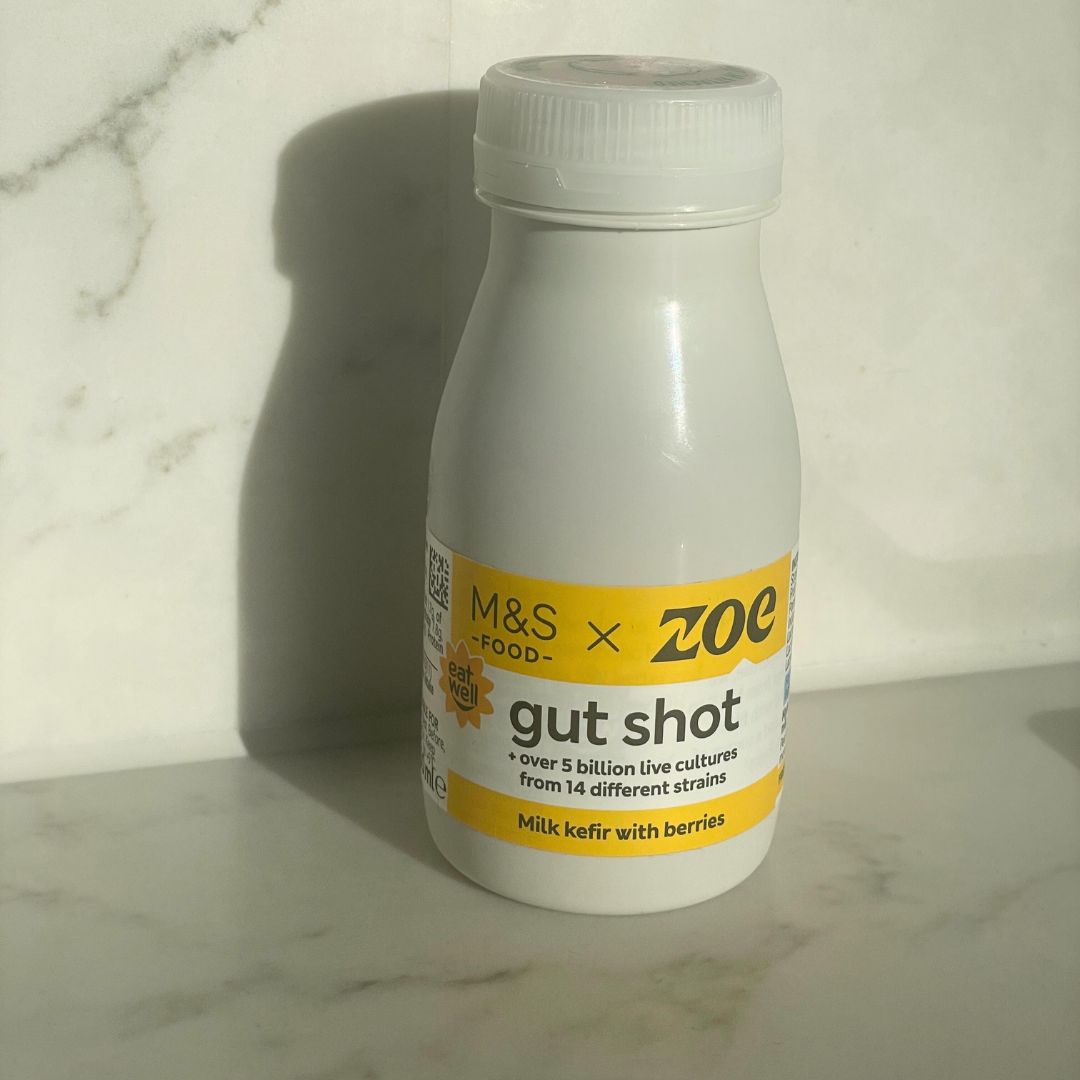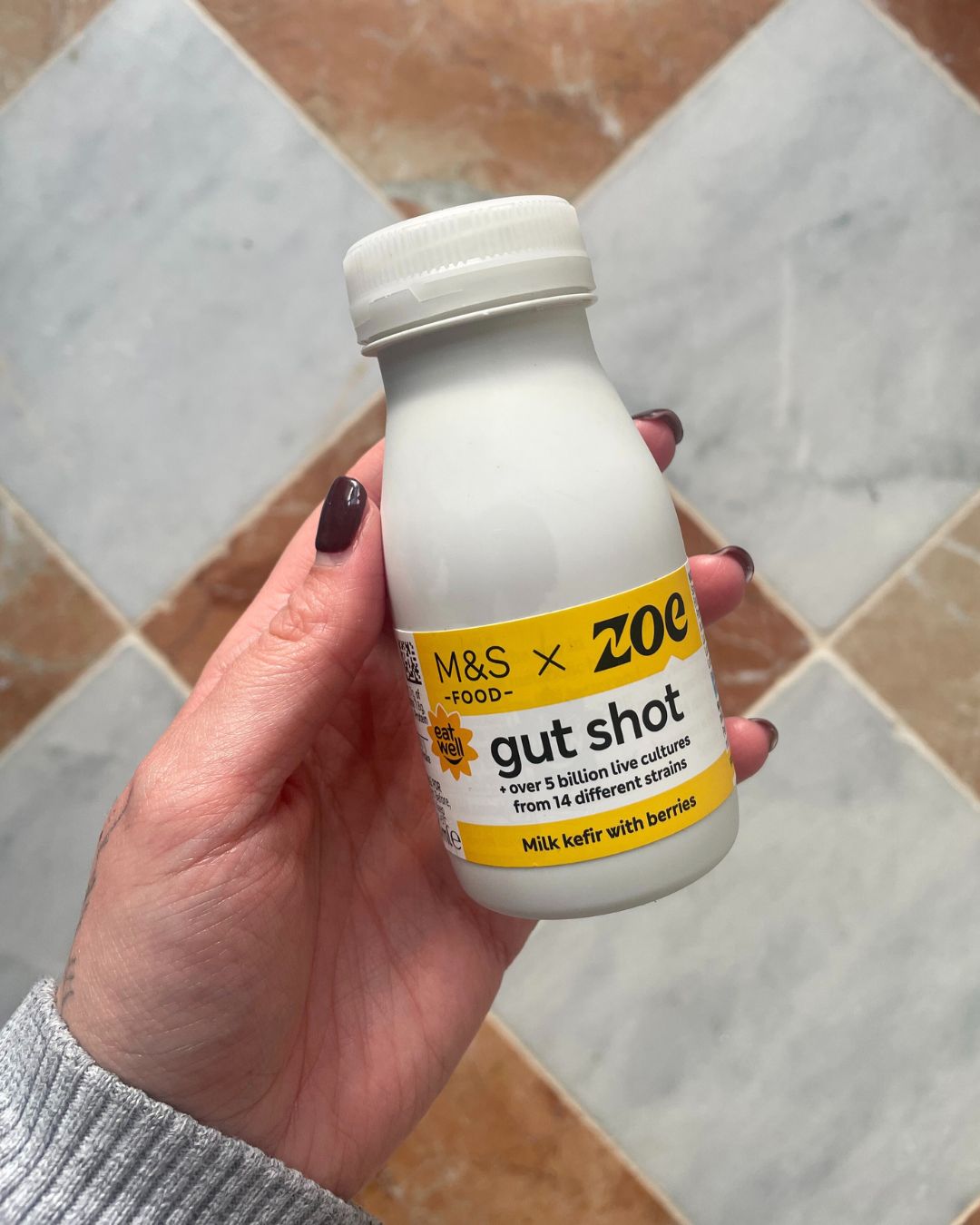
When I saw the M&S gut shot land on shelves last month, I was intrigued, to say the least. Designed alongside the team at Zoe, the science nutrition company co-founded by Professor Tim Spector, the new gut shot promises to deliver over five billion live cultures from fourteen different strains in one 150ml drink.
As far as trending topics within the wellness realm go, gut health (specifically, improving one’s own) is a pretty positive one. From digestive function to mental wellbeing, research has proven that gut health is linked to many of the body’s vital processes, suggesting a correlation between the quality of your gut microbiome and the efficacy with which your body fulfils various responsibilities, such as breaking down food and absorbing nutrients.
While even among the most skilled scientists there are still many unknowns where the gut is concerned, one thing's for sure: as more connections between gut health and overall wellbeing emerge, we become hungrier for gut health "hacks" to tweak, enhance, and upgrade the health of our own in an attempt to improve how our bodies function and reduce unhealthy gut symptoms. Which is where the M&S gut shot comes in.
At the time of writing, there are 491.7 thousand uses of the #guthealth hashtag on TikTok, and social media isn’t the only place we’re seeing an uptick of interest in the topic. Online grocery store Ocado has witnessed a 247% increase in searches for "gut health" on its website since 2021. The stats speak for themselves – but is a gut health shot the answer? In the name of journalism, I tried one every day for a week to find out. Do read our guide to the much-debated leaky gut, while you're here.
M&S gut shot review - so, is the world-first really worth trying?
What is the new gut health shot from M&S and Zoe?
Portioned in small white bottles with a bright yellow label, a la the Zoe branding, the new gut shot is a kefir beverage that packs a punch. Made from whole fermented milk and fruit, including blackcurrant, strawberries, baobab and blueberries, it also promises to contain an impressive five billion live cultures - not bad for a small drink.
It’s based on nearly a decade of Zoe’s microbiome research, created to support gut health. According to Claire Richardson, M&S food product developer of the Gut Shot, it’s not just any gut shot, it’s a M&S and Zoe gut shot (presumably said in the iconic M&S advert tone).
“We’ve combined the world-leading gut health expertise of Zoe nutritional scientists, with the quality and taste you’d expect from M&S, to bring you the ultimate daily shot, with billions of live bacteria, to help support your gut health,” she says.
“The Gut Shot is unique, it combines a mix of live probiotic strains as well as other ingredients including fibre and polyphenols from colourful fruits all of which support gut health. Plus, it contains calcium and fibre and there’s absolutely no added sugar or sweetener, artificial gums or emulsifiers so you know you are really getting a shot of goodness every morning.”
What are the main benefits?
While there remain many question marks on the topic of gut health and how to improve it, some research does indeed indicate that fermented foods, including kefir (a fermented milk drink that bears similarities to yoghurt – only with a thinner consistency) may facilitate alterations in the gut microbiota composition (in other words: microorganisms, including bacteria, fungi, and viruses that reside in the digestive tracts). More science is needed on the subject, but the research so far is promising.
“Gut health and an optimal gut microbiome are vital for our overall health,” says Professor Tim Spector. “Increasing the fibre in our diet and introducing fermented foods such as kefir are evidence-based ways to help our gut microbes keep us happy and healthy.
“At Zoe, we are passionate about giving people simple tools to improve their gut health. Thanks to our partnership with M&S, everybody can add fermented food and fibre to their daily life in one easy gut shot.”
@marksandspencerirl ♬ original sound - Marks and Spencer Ireland
What does an independent nutritionist have to say?
When I asked BANT registered nutritionist Eva Humphries for her unbiased opinion of the Gut Shot, she gave them a thumbs-up for convenience.
“Our gut is home to trillions of bacteria and other microorganisms, collectively known as the gut microbiome," she explains. "A "healthy" gut microbiome is understood to be diverse and large in number."
That said, sadly many of the practices of normal human life may deplete our gut microbes over time, she goes on. She lists stress, alcohol consumption and a poor-quality diet as factors likely to have an impact on your gut health. “Gut health shots like the M&S x Zoe one work on the basis of introducing new or more of the beneficial microbes in an easy-to-consume format."
“If your diet isn’t great or you spend a lot of time indoors or perhaps you are over 65 years of age, gut health shots like this would likely confer a benefit since they’ll probably introduce new beneficial microbes.”
That said, Humphries emphasises that gut health shots such as these are only part of the solution. “Eating a wide variety of plants and getting outdoors daily are still important factors in gut health that shots like this won’t be able to deliver.”
What happens when you drink a gut health shot every day for 7 days?
Days one to three
Before the gut health shots arrive in the mail, I’m none the wiser as to what’s actually in them. I’ve scanned the billions-of-bacteria tagline, but I haven’t looked at an ingredients list. I’m quietly relieved when they arrive and I learn they’re just single servings of fruity kefir – in part, because I already know I enjoy the taste of kefir and I’m familiar with its merits for gut health, also because I had been imagining something far more complex.
While many of my incredible colleagues have tried (and rate) Zoe’s protocol, which provides you with personalised intel on your blood sugar and gut health following various tests and the wearing of a blood sugar sensor, I’ve consciously avoided trying (or writing about) it myself for a couple of reasons. The first is personal - for a period of time in my twenties I was all-consumed with my diet, my exercise routine and my health. I counted every calorie I consumed and obsessively alternated between cutting out gluten, dairy, carbs, processed foods on a loop in a misguided attempt at attaining "good" health. What I ended up with was quite the opposite – a sicky feeling in my stomach most mornings from undernourishment, missing periods and a total inability to focus on anything besides my physical wellbeing. I worry that having too much information at my fingertips will trigger these behaviours once more.
My second reason for steering clear is simply that I don’t believe it’s a protocol necessary for everyone, and that there are easy ways for the generally-healthy population to improve their gut health and energy levels that don’t involve wearing a blood sugar monitor and eating muffins on repeat. But, that’s just me.
Although created in collaboration with Zoe, the gut health shots aren’t a part of the protocol, and they strike me as surprisingly simplistic in concept in comparison to what Zoe is known for.
I know that kefir isn’t quite to everyone’s taste, but I really enjoy the flavour of the drink. To me, it tastes like a cross between kefir and a smoothie. It’s got the tart, tanginess of the fermented milk drink, plus a subtle sweetness from the fruit puree.
When I start the review, I’ve just come down with a nasty cold and, while I’m well aware that taking supplements and chugging health drinks won’t bring about some miracle cure, I know that getting some more nutrients into my diet – and giving my gut health some attention – can only be a good thing for supporting my recovery, so now seems like a good time to have a fridge full of gut health shots.
By day three, I’m fully invested in the habit. I’ve been drinking the shot somewhere between breakfast and lunch, and I’m starting to look forward to the routine of sipping the fruity kefir while ticking off a work task. Far from a chore, it feels like a little yoghurty treat.

Days four to seven
On the afternoon of day four, I noticed that for the first time in a few weeks I’d been, ahem, regular. Although I don’t have any diagnosed gut issues, I do experience bloating and constipation fairly frequently, and over the past few years I’ve made a conscious effort to increase my fibre intake with oat-based breakfasts and veg-heavy meals for lunch and dinner, which seems to work well. I’m also taking prescribed iron supplements, something that’s associated with constipation.
Over Christmas, however, my diet unsurprisingly shifted as I got stuck into many roasts and cheese boards and I concentrated less on my fibre intake, and I’m still not yet back in the habit of eating as much veg as I’d like. This means that, despite taking a daily probiotic supplement for the past couple of months, I’m regularly bloated and experiencing mild stomach discomfort.
Midway through trialling the gut health shots, though, my belly feels less swollen and food appears to be moving through my digestive tract at a reasonable pace. There are a few additional factors that may have influenced this, however. After being sofa-bound with a cold for four days, I’m finally feeling well enough to move my body, and so while I’m not rushing back into strenuous activity, I am clocking up a fair amount of steps. Exercise, research tells us, can aid digestion and relieve constipation. I also just finished a period, so the menstrual-associated bloat I had last week has subsided now.
There’s no saying for sure whether my happier bowels are linked to the introduction of the gut health shots into my routine, so I ask Humphries to clarify how long it usually takes to notice any changes when you start taking kefir. The answer, she says, isn’t straightforward. “Studies looking at kefir supplementation are generally carried out over a period of three to six weeks. This was a sufficient amount of time to see a benefit in the study subjects, but studies notoriously use a predominantly healthy population.” Perhaps the two are connected, perhaps it’s a coincidence. I’d have to test the shots for longer to get a better idea.
A query I’ve had throughout the trial is why the shots are only sold as single servings (or packs of three), as opposed to multiple servings in a larger bottle. While the single measure is handy for getting your ideal portion size without weighing and guesswork, it’s less eco-conscious. Apparently, though, bigger bottles are in production and will be available to purchase sometime soon.
Another sticking point is that the gut shot isn’t vegan, so those with dairy allergies or simply following a plant-based diet aren’t able to try it.
After drinking my final shot on day seven, I realise that it was more than two weeks past its best before date and start wondering whether that might have something to do with the digestive effects I experienced. We’ll never know, I suppose.
Would I introduce the gut health shot into my routine permanently?
All in all, I liked the M&S gut shot. I enjoyed the flavour and the routine of drinking it every day, and positive digestive changes which could have been linked with my taking of the daily shot. I think that it’s very likely I, personally, could benefit from introducing kefir into my diet more regularly.
That said, I won’t be committing to drinking this particular gut shot every day – in part, due to the impracticality of storing so many tiny bottles (they aren’t particularly big, but seven of them took up half a shelf in my fridge), and also because of the price point. You can purchase a 1L bottle of kefir for around £3.50 from some supermarkets – less than the cost of two single servings of the M&S x Zoe collab.
I'll definitely be picking up a gut shot from time to time when I’m on the go or travelling, though. I liked the taste, I liked the ingredients list, and I liked the feeling of supporting my gut when I’m less able to get the nutrients it needs through food. Will you be giving it a go?
How to improve gut health
According to Humphries, there are three key ways to improve your gut health.
1. Aim for a wide variety of plants
“Gut microbes love variety,” she says. “Different plants contain different fibre types and polyphenols which are both fuel gut microbes. The more of this fuel we can give them, the stronger their populations may become.”
Polyphenols, Humphries says, are an area of new research interest. They are plant compounds that may provide health benefits, and they’re usually related to a colour, smell or particular flavour profile. “For example, some berries get their colour from anthocyanin, a polyphenolic compound that research suggests may support the growth of bifidobacteria. Garlic contains allicin, another polyphenol, that is linked with reductions in "bad" bacteria,” she says.
@tasteofnutrition ♬ She Share Story (for Vlog) - 山口夕依
2. Get outdoors daily
Natural environments, such as woodlands and coastal areas, are chock full of bacteria, according to Humphries.
“Interestingly, studies on both children and adults found the more time we spend in natural environments, the more it helps our gut microbes become diverse. Diversity is key for a ‘healthy’ gut microbiome. Conversely, sitting indoors all day may reduce the number of microbes in our gut,” she says. Walking workouts at the ready.
3. Introduce fermented foods
Kefir is just one type of fermented food that can have a positive impact on your gut health. Sauerkraut, kimchi and kombucha are all natural sources of beneficial microbes, Humphries advises.
There are, however, a couple of things to be mindful of. “Go for fermented foods that ‘live’ in the fridge section. Shelf stable products are often pasteurised, meaning the beneficial bacteria are killed,” Humphries says. Secondly, she cautions to proceed slowly. “Introducing too many fermented foods or large quantities may lead to bloating. Effectively, you need to let your gut microbes catch up so smaller quantities consistently may be better in this regard.”
Try the M&S gut shot now:
Are M&S gut health shots good?
According to BANT registered nutritionist Eva Humphries, she said they're an easy and convenient way to up your healthy gut bacteria. Simply pick one up next time you're in M&S and give them a go.
That said, there are lots of other important factors when it comes to gut health, too. These span reducing your stress levels, getting enough good quality sleep, moving your body in a way you enjoy, and eating a diverse range of vitamins and minerals every day. "These still important factors in gut health that shots like this won’t be able to deliver," the expert shares.







